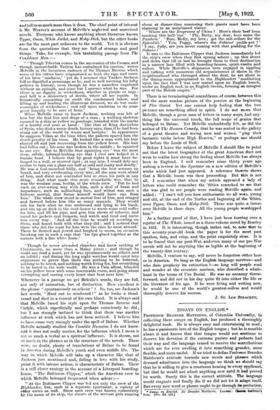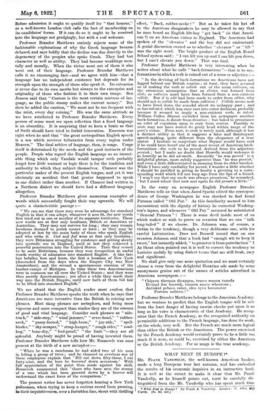ESSAYS ON ENGLISH.*
Paopxssox BRANDER MATTHEWS, of Columbia Univessity, in collecting these essays on English, has produced a thoroughly delightful book. He is always easy and entertaining to read ; he has a passionate love of the English tongue ; but he is sensible about it and knows that that tongue would not continue to deserve his devotion if the extreme purists and pedants had their way and the language ceased to receive the contributions which are for ever swelling it into something grander, more flexible, and more useful. If we tried to define Professor Brander Matthews's attitude towards new words and phrases which demand admittance into the language we think we should say that he is willing to give a courteous hearing to every applicant, but that he would not admit anything new until it had proved its worth. Surely this is the correct attitude. The language would stagnate and finally die if we did not let it adapt itself. But every new word or phrase ought to go through its probation.
• Essay+ on English. By Brander Matthews. Leann : Moto liartbner's Saw. DOI. Od. nets.
Before admission it ought to qualify itself for " that honour," as a well-known London club calls the fact of membership on its candidates' forms. If it can do so it ought to be received into the language not grudgingly, but with a real welcome. Professor Brander Matthews entirely rejects some of the fashionable explanations of why the Greek language became debased, and says boldly that the decline was due directly to the degeneracy of the peoples who spoke Greek. They had lost character as well as ability. They had become weaklings men- tally and morally. When the virtue went out of them it also went out of their language. Professor Brander Matthews calls it an encouraging fact—and we agree with him—that a language has no independent existence but depends for its strength upon the strength of those who speak it. Its extension is never due to its own merits but always to the enterprise and originality of those who fashion it in their own image. Ben Jonson said that " Custom is the most certain mistress of lan- guage, as the public stamp makes the current money." But then he added the caution, " We must not be too frequent with the mint, every day coining." His was the same attitude as
we have attributed to Professor Brander Matthews. Every person of sense must see upon reflection that a fixed language
is an absurdity. It is surprising that so keen a brain as that of Swift should have tried to forbid innovation. Emerson was right when he said that " the great metropolitan English speech is a sea which receives tributaries from every region under Heaven." The final arbiter of language, then, is usage. Usage itself is determined by the needs and the good instincts of the people. People who regard the English language as an immut- able thing which only Vandals would tamper with probably forget how little warrant or logic there is for the tradition and authority to which they subject themselves. Chaucer was the particular maker of the present English tongue, and yet it was obviously an accident that that genius happened to speak
in one dialect rather than another. If Chaucer had written in a Northern dialect we should have had a different language
altogether.
Professor Brander Matthews gives numerous examples of words which successfully fought their way upwards. We will quote a characteristic passage :-
" We can see that there may even be advantage for standard English in that it can adopt, whenever it sees fit, the new words first tried out in one or another of its separate territories. These new words are at first only localisms, British or American or Australian. They may not survive for long ; they may remain localisms doomed to perish sooner or later ; or they maybe adopted at last by the main body of those who speak English and who write it. Cad and fad were at first only localisms ; they were Briticisms struggling for existence and getting slowly into sporadic use in England, until at last they achieved a peaceful penetration into the United States. Then they ceased to be mere Briticisms, because they won recognition as useful words worthy of admission into standard English. A like fate has befallen boss and boom, the first a localism of New York (descended from the days when the Empire City was New Amsterdam), and the second a spontaneous creation of the lumber-camps of Michigan. In time these two Americanisms were in common use all over the United States ; and they were then merely Americanisms ; yet after a while they made their way into the British Empire, until now both of them bid fair to be lifted into standard English."
We are afraid that the English reader must confess that Professor Brander Matthews speaks the truth when he says that Americans are more inventive than the British in coining new
phrases. Most slang phrases are metaphors, and being more vigorous and more compact than similes they are of the essence of good Sand vital language. Consider such phrases as " side- track," " side-step," " wind-jammer," " scare-head," " rubber- neck," " pussy-footed," " high-brow," " joy-ride," - " spell- binder," " sky-scraper," strap-hanger," " rough-rider," " road- hog," " bone-dry," " fool-proof," " the limit "—they are all splendid. Anybody might be proud of having invented them. Professor Brander Matthews tells how Mr. Roosevelt was once present at the birth of a new metaphor :—
" When he was a ranchman he had aided two of his men in felling a group of trees ; and he chanced to overhear one of these employees explain that ' Bill cut down fifty-three, I cut forty-nine, and the boss he beavered down seventeen.' With full appreciation of the point thus made against his skill, Roosevelt commented that ' those who have seen the stump of a tree which has been gnawed down by a beaver will understand the exact force of the comparison.'
. The present writer has never forgotten hearing a New York policeman, when trying to keep a curious crowd from pressing, .in their inquisitiveness, over a forbidden line, shout with thrilling
effect, " Back, rubber-necks ! " But as be takes his hat ofl to the American slangmakers ho may be allowed to say that he once heard an English lift-boy " get back " (is that Ameri- can ?) on an American visitor to England. The American had spoken of the " elevator " and the boy did not understand. A genial discussion ensued as to whether " elevator " or " lift " was the right word. The bright product of the English Board School system said : " I can lift you up and I can lift you down, but I can't elevate you down." That was final.
Professor Brander Matthews is very interesting when he writes about what he calls " back-formations "—that is to say, formations in which a verb is coined out of a noun or adjective:— " In the devising of back-formations we Americans have not lagged behind our British cousins ; at least, they have accused us of making the verb to collide out of the noun collision, on the erroneous assumption that as elision was formed from elide, so collision must have been formed from a non-existent collide. But if to edit had been made to order from editor, why should not to collide be made from collision ? Collide seems now to have lived down the scandal about its unhappy past ; and so has talented, which was once cast into outer darkness, probably because it seemed to imply a non-existent verb, to talent. William Cullen Bryant excluded from his newspaper another back-formation, to donate from donation ; but failed to pronounce an edict of expulsion upon to orate from oration. Possibly to orate may not have reared its grisly head within range of the poet's vision. Even now, to orate is rarely used, although it has a distinct utility in that it suggests a false and flamboyant speech-making, quite different from the eloquence of a true orator. I hesitate to conjecture what Bryant would have said if he could have heard one of the most recent of American back- formations—the verb to be peeved, derived from the adjective peevish ; but I make no doubt that Howells would welcome it as heartily as he did ad-smith. Assuredly he was peeved ' is a delightful phrase, more subtly suggestive than he was peevish,' and even a little differentiated in meaning from its elder brother. While I have only cordiality for peeved, I wonder a little whether I should be justified in giving so hearty a greeting to a corre- sponding word which fell not long ago from tho lips of a friend. I won't say that my uncle was always penurious, he remarked,
but I must admit that now and again he did penurc a little.' "
In the essay on newspaper English Professor Brander Matthews tells us that when Jared Sparks edited the correspon-
dence of George Washington he was shocked to find Israel Putnam called " Old Put." As this familiarity seemed to him inconsistent with the dignity of history he corrected Washing-
ton's lapses, and whenever " Old Put " occurred he substituted " General Putnam " I There is some devil inside most of us which makes us wish to prove on occasion that we can " talk long-tailed " if we choose.. Dr. Johnson was, of course, a victim to the tendency, though a very deliberate one, with his careful Latinization. - Does not Boswell record that on one occasion Johnson said that a book had " enough wit to keep it sweet," but instantly added, " to preserve it from putrefaction " ? As Skeet often pointed out it is well to correct tho tendency to Latinize unduly by using dialect terms that are still fresh, racy and significant.
We shall give only one more quotation and we must certainly
choose a verse from the delightful Horatian ode made by some anonymous genius out of the names of articles advertised in American newspapers. :— " Chipeco thermos dioxygen, temco senora tuxedo Besinol fiat bacardi, camera ansco wheatena ; Antiskid pebeco calox, oleo tyco barometer Postum nabisco " Professor Brander Matthews belongs to the American Academy.
but we venture to predict that the English tongue will be safe from the least danger of having unwise checks put upon it so long as his voice is characteristic of that Academy. He recog-
nizes that the French Academy, as the recognized anthority on permissible additions to the French language, has done its work, on the whole, very well. But the French are much more logical than either the British or the Americans. The power exercised by the French Academy would certainly prove to be a little too much if it were, or could be, exercised by either the American Or the British Academy. For us usage is the true academy.



































 Previous page
Previous page